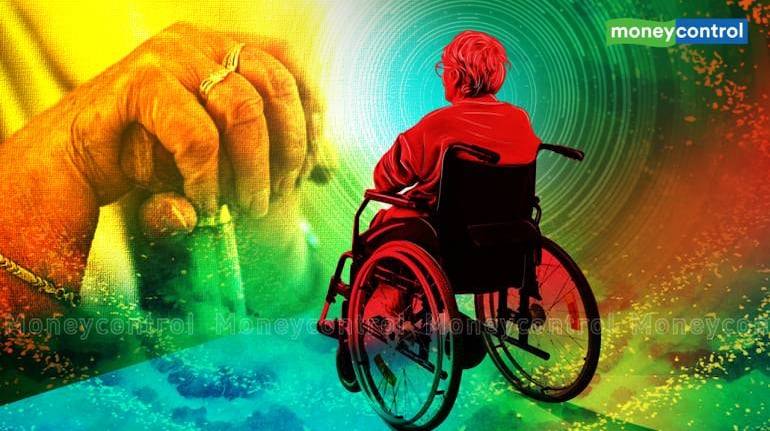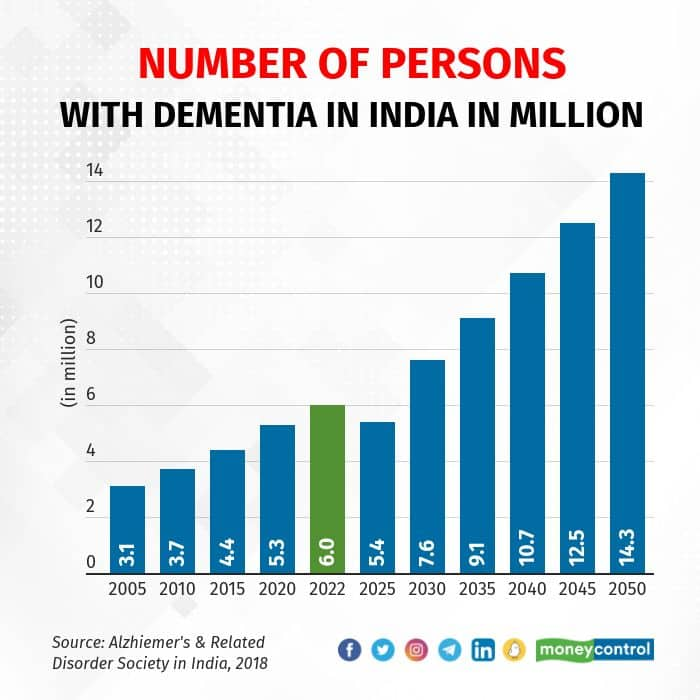



More than 15 million elderly Indians are susceptible to dementia because of cognitive impairment caused by the COVID-19, according to the Alzheimer’s and Related Disorder Society of India (ARSDI).
The pandemic marked an increase in the worsening of symptoms and sings of dementia in India, leading to an increase in the number of patients in the country, the society said.
Dementia is a term used to describe a group of symptoms affecting memory, thinking and social abilities, according to the website of Mayo Clinic. Several diseases can cause dementia of which Alzheimer's disease is the most common cause in the elderly.
"The elderly have become ultra-vulnerable to Alzheimer's disease because COVID has aggravated major dementia risk factors like diabetes, hypertension and cardiovascular diseases. About 10 to 12 percent of elderly population with co-morbidities hence are at risk," said R. Narendhar, Executive Director, ARDSI.
Also read: J&J to challenge Maharashtra FDA's order cancelling license of its baby powder
World Alzheimer's Day is observed on September 21 every year.
COVID-19 fallout
Dr. Manjari Tripathi, president of ARSDI’s Delhi chapter, said the deposition of an abnormal protein called beta-amyloid in the brain marks the beginning of Alzhimer’s disease.
“The disease starts much before the symptoms show up. The symptoms may come at a certain age,” she added.
The professor of neurology in All India Institute of Medical Sciences, New Delhi, said the COVID pandemic had led to an increase in aggression and restlessness.

“Memory and thinking went for a toss too. To add to this, if a person with dementia had COVID, the cognitive functions took a turn for the worse. We are still trying to come to terms with this,” she added.
Dr Tripathi said one of the big causes of an increase in the severity of dementia was that the regular treatment that doctors provide for a cognitive decline couldn’t be followed during COVID.
ARSDI estimates that 5 out of every 100 elderly people in India have dementia and many more are at high risk of developing the condition.
“The patients’ number has been rising as a policy addressing this disease is lacking in India. There are currently 6 million people with dementia in India, which is concerning,” said Narendhar.
A report by the Strengthening Responses to Dementia in Developing Countries (STRiDE) project states that the meta-analysis of individual studies conducted across different regions of India have reported pooled prevalence estimates to range from 3.4 percent to 4.4 percent for dementia.
Need for policy on dementia
While there are six million Indians suffering from dementia, there are no laws specifically protecting the rights of people suffering from the condition and their caregivers.
Researchers working on dementia say despite being a high burden disorder, measures taken to address it haven’t dealt with core problems.
“There are only 2.3 million HIV cases in India and we have a separate AIDS policy in India. The tuberculosis patients in India are little over 2.4 million, and we have a policy for that too,” said Narendher, noting that no national policy on dementia existed.
Bharti Pawar, minister of state for health, said in parliament in reply to a question from lawmaker Varun Gandhi that the government hadn’t planned to introduce a national policy on Alzheimer‘s disease.
While there are no laws specifically protecting the rights of people with dementia and their caregivers, India has legislation in place to safeguard the rights of elderly, people with mental health conditions and disabilities that are relevant or applicable to dementia.
These include the Maintenance and Welfare of Parents and Senior Citizens Act, 2007, the Rights of Persons with Disabilities Act, 2016, and the Mental Health Care Act, 2017.
Discover the latest Business News, Sensex, and Nifty updates. Obtain Personal Finance insights, tax queries, and expert opinions on Moneycontrol or download the Moneycontrol App to stay updated!
Find the best of Al News in one place, specially curated for you every weekend.
Stay on top of the latest tech trends and biggest startup news.